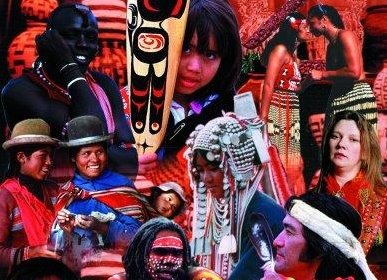
Despite being the oldest group of humans yet researched by New Zealand's Massey University DNA project Kenya's Turkana people are not, according to the United Nations, 'indigenous'. Having some 35,000 years of history won't quite qualify one for favoured treatment by the UN's new Human Rights Council. Yet if you arrived in Kenya 500 years ago, you will get General Assembly recognition and special 'rights'.
This is the useful conclusion of the UN's newest body. Gone from the disbanded old Human Rights Commission are champions of humanity like Saddam's Iraq ( which once chaired it),Syria and Zimbabwe. In are new champions of humanity like Cuba, Saudi Arabia, China and Russia.
Saudi Arabia is busy modernizing it's image and industry with oil-boom cash. The kingdom just exported a batch of Hand Amputation Machines to Nigeria's sharia Kano State.
Meanhile the new UN Rights Council has the urgent task of sending to the General Assembly a 'vital' bill guaranteeing the rights of 'indigenous peoples'.
To most people, 'indigenous' has the simple meaning of people who were the original inhabitants of a land. Thus in Africa the Bushmen, Pygmies, Baka, Berbers and other groups are rightly nominated in the UN list of indigenes. However it also pays to be colourful, exotic and live next to the world's greatest wildlife parks, even if you are Tribesman-Come-Lately.
Thus Mjikenda and related Swahili Kenyans, who have lived around Mombasa for at least a millenium, are not indigenous enough. They don't wear lion's manes, red-ochre and wave long spears, but rather shapeless, white cotton tunics called kanzu.
Maybe Kenya's Agikuyu who arrived there around 1100 AD are indigenous? If you've been checking out the fate of the 35,000 year old Turkana, you will know this answer. The fact that we have have 1 million year old ancestor hominid sites at Lake Turkana, where live the You-know-who tribe , still won't swing it for those "non-natives".
They drink an awful lot of coffee in the corridors of the UN - what else is there to do in Diploland? Like Legoland it's a place where only fantasies take shape. This leads to reading lots of coffee-table books. There have been more big glossy books written about Kenya's Maasai people (arrived in Kenya around 1450 AD via Chad and Sudan)than any other East African tribe. No surprise then that the only people in Kenya who qualify for 'indigenous', in the UN's report, are the Maasai. There is talking turkey. Then there is talking Turkana, and the Unocrats have the balance right.
How the Kenya Government will vote when the Human Rights Council bill reaches the General Assembly, nobody knows. Hopefully it will be in favour of a bill which declares 90% of their own Kenyans 'foreigners'. Kenyans of Maasai origin are good, normal citizens and frankly need no special affirmation compared to any other inhabitants.
Stand by for waves of professional Masaai activists clad in beads and shukas claiming back the whole country they once ruthlessly conquered from the 'pre-indigenous' people who were inconveniently in Kenya before them. One of the special UN rights for the 'indigenous' is naturally land. That's material enough for 56 more books, 3 mini-series and "Maasai, The Movie!".
1 comment:
As noted at my blog that choice makes quite a few other people indigenous that might otherwise be considered invaders.
Post a Comment